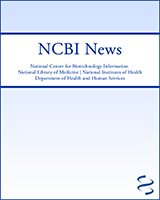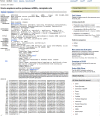NCBI Bookshelf. A service of the National Library of Medicine, National Institutes of Health.
NCBI News [Internet]. Bethesda (MD): National Center for Biotechnology Information (US); 1991-2012.
Featured Resource: The New Entrez Sequence View has an Emphasis on Discovery
NCBI now has an updated sequence view for nucleotide and protein records that provides better display options, links to analysis tools, and an emphasis on the discovery of related information in other NCBI databases (Figure 1). The new view retains the standard format of the sequence but has more obvious links to display FASTA, other formats, and specific subregions and features. The right-hand discovery column features direct links to analysis tools, and, most importantly, explicit links to valuable related information such as better-annotated sequences, and more information-rich databases such as Gene, HomoloGene, and PubMed.
New display links, regions and feature options
The format row at the top of the new view has direct links to display the sequence in FASTA format and to display the record and features in the NCBI Graphical Viewer (NCBI News, Aug 2008). Other less specialized reports such as ASN.1 and XML are available through the separate “More formats” list. A “Download” link to save the records in various formats to a local file and a “Save” link to store the records in the NCBI Clipboard or through MyNCBI in “My Collections” for later use are located at the right-hand end of this row along with the traditional “Links” menu that provides links to related information in other databases. Several of the more useful items from the “Links” menu are listed explicitly as Discovery column items described in the “Discovery Links” section below. The expandable display controls, “Change Region Shown” and “Customize View”, are located below the Links menu on the right-hand-side. The “Change Region Shown” control provides a convenient mechanism for displaying specific regions of the sequence. The “Customize View” control specifies the number and kinds of annotated features and the DNA strand that is shown.
Direct entry to analysis tools
The NCBI Discovery column begins just below the display controls with direct access to sequence analysis tools. The NCBI primer designing tool, Primer-BLAST (NCBI News, Nov 2008), is linked here now. Additional tools will be added in later versions of the viewer including a direct link to run a BLAST database search. In all cases these analysis tools are set in advance to provide the most relevant and up-to-date results appropriate to the context. For example, following the “Pick Primers” link from a human mRNA sequence in the viewer loads the Primer-BLAST form already set up to perform a specificity check against the appropriate background database, the human genome transcripts in this case. Moreover if the search is run with an older GenBank sequence as the query, the equivalent NCBI Reference Sequence (RefSeq) will be substituted to improve specificity checking. Direct access to analysis tools will streamline many visits to the NCBI Website by providing one-click, live access to the computing power of the NCBI.
Discovery Links
As shown in the figure, the links in the Discovery column expose several highly relevant and useful sets of related information. These include selected relevant articles in PubMed (“Articles about KLK6”), links to corresponding mRNA and protein Reference Sequences, a link to the corresponding Gene record (“More about the KLK6 gene”), and links to homologs in other species provided by HomoloGene (“Homologs of KLK6”). For the record shown in the figure, these Discovery column items automatically update the biology and nomenclature for this older GenBank record, identifying it at a glance as a transcript of the human kallikrein-related peptidase gene, KLK6, and providing in a single click the Reference Sequences for the three of known splice variants of this gene. Each of these has additional biological annotations directly on the record plus its own discovery column. A link to “Order cDNA Clone” provides access to molecular reagents for this transcript. The “Articles about …” link is an enhanced set of human-reviewed references about KLK6 combining the citations from the Online Mendelian Inheritance in Man (OMIM) article for this gene with the linked articles from the NCBI Gene record. These constitute an essential set of literature about the biological roles of the KLK6 gene and its products. Finally, the “More about the KLK6 gene” link provides direct access to the Gene record, a gateway to the human genome and all molecular biology information about the KLK6 gene.
Summary
The new Entrez sequence provides intuitive display controls, direct access to live analysis, and to the rich pre-compiled information available through Entrez Gene, OMIM and Homologene. The current version and future improvements move the sequence databases towards a condition where even older sequences become self-annotating and are automatically updated through the analysis performed at the NCBI evident in the Discovery column. These enhancements should make the NCBI Entrez system a more efficient experience for visitors and easier to use as a Discovery system.
New Databases and Tools
Genome Build
Build 1.1 of Hydra magnapapillata is available in the Genomes database and on the NCBI Map Viewer. The Map Viewer page is: www.ncbi.nlm.nih.gov/mapview/map_search.cgi?taxid=6085
Microbial Genomes
Twenty-eight finished microbial genomes were released between January 14 and February 6. The original sequence data files submitted to GenBank/EMBL/DDBJ are available on the FPT site: ftp.ncbi.nih.gov/genbank/genomes/Bacteria/. The RefSeq provisional versions of these genomes are also available: ftp.ncbi.nih.gov/genomes/Bacteria/.
GenBank News
GenBank release 170.0 is available via web and FTP. The current release includes information available as of February 13, 2009. With this release, the new DBLINK linetype is now legal for GenBank sequence records, and it will begin to appear in GenBank Update files, soon after GenBank 170.0 is made available. Release notes are on the on the ftp site: ftp.ncbi.nih.gov/genbank/gbrel.txt
Updates and Enhancements
Clone Finder
The Clone Finder tool, designed to identify genomic clones on a genome assembly, has been updated with an improved search interface that makes it easier to search by feature. Clone Finder also offers the ability to filter clones on results pages using feature information, and more informative pop-up menus on clone features. The performance of graphical view is improved and now integrates the library table view. The tool will now allow users to download all clones, or only clones from a given library in Excel format.
Documentation on Clone Finder can be found on the following Web page: www.ncbi.nlm.nih.gov/projects/mapview/static/clonefinder_documentation.shtml
UniVec
UniVec database build 5.1 is now available. UniVec is a non-redundant database of vector sequences used in conjunction with the VecScreen tool to identify vector sequence contamination in nucleotide sequences. The number of sequences in UniVec has increased by 2% for build 5.1. The vector BLAST database has also been updated to contain full-length versions of all sequences from GenBank that were used in the current UniVec build.
PubMed
The PubMed Summary page now displays information about free articles from publishers. The new information is in addition to the PubMed Central links that appear for full-text PMC articles. For more information, see the NLM Technical Bulletin article: www.nlm.nih.gov/pubs/techbull/jf09/jf09_pm_free_article.html . The current issue of the Technical Bulletin also has an informative article about shared settings in the My NCBI tool.
Exhibits
NCBI will have an exhibit booth at the Experimental Biology Annual Meeting on April 18-22 in New Orleans, Louisiana.
Announce Lists and RSS Feeds
Fifteen topic-specific mailing lists are described on the Announcement List summary page. Announce lists provide email announcements about changes and updates to NCBI resources. www.ncbi.nlm.nih.gov/Sitemap/Summary/email_lists.html
Seven RSS feeds are now available from NCBI including news on PubMed, PubMed Central, NCBI Bookshelf, LinkOut, HomoloGene, UniGene, and NCBI Announce. Please see: www.ncbi.nlm.nih.gov/feed/
Comments and questions about NCBI resources may be sent to NCBI at: vog.hin.mln.ibcn@ofni, or by calling 301-496-2475 between the hours of 8:30 a.m. and 5:30 p.m. EST, Monday through Friday.
- NCBI News, March 2009 - NCBI NewsNCBI News, March 2009 - NCBI News
Your browsing activity is empty.
Activity recording is turned off.
See more...

